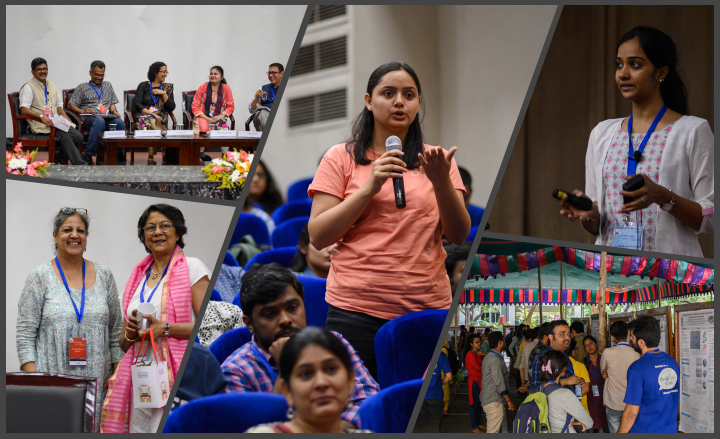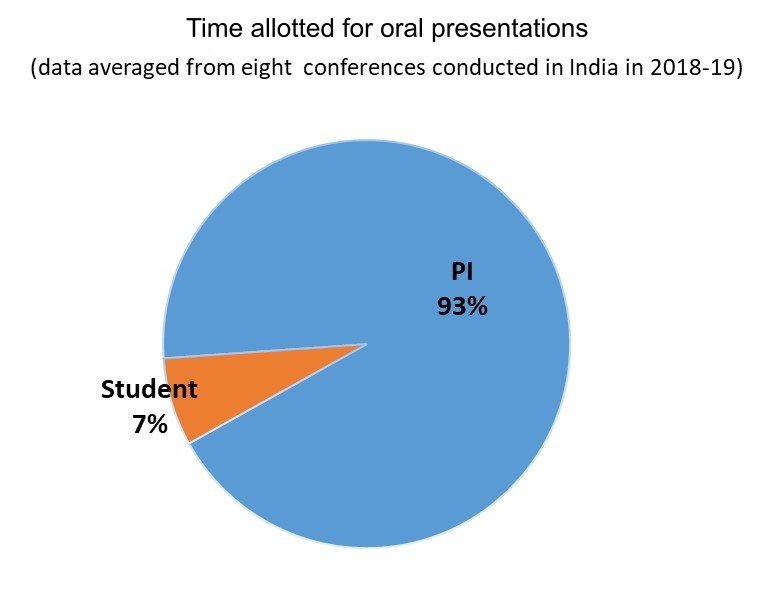In one of India’s first student-led scientific conferences, Hy-Sci (Hyderabad Science) 2019 brought together graduate students, researchers, and science professionals on a single platform to discuss science as well as to deliberate on the scientific ecosystem in India.

On 29 August 2019, Hyderabad witnessed an unconventional confluence of researchers from institutes and universities across the city, called Hy-Sci (Hyderabad Science) 2019. The meeting was organised by students of CSIR-Centre for Cellular and Molecular Biology (CCMB). A striking feature of this event was that unlike conventional conferences, this was conceptualised, curated and executed entirely by graduate students. The objective was to foster dialogue and collaborations among researchers in the city.
Collaborations are indispensable for research. When great minds come together, the whole is larger than the sum of its parts. Hyderabad is a hub of biological research with over 14 independent multidisciplinary research institutes and universities, and has immense potential for top-class collaborative research. Hy-Sci was attended by over 250 students and more than 50 principal investigators across the city.
Oral and poster presentations

A unique feature of this meeting was that all of the presentations (talks and posters) were by the students, as opposed to many conferences, where the time allotted for student presentations is less than ten per cent of the total.
The speakers for oral presentations were chosen by a panel of principal investigators from different institutes in Hyderabad. The talks covered a wide range of topics, ranging from the regulation of chromosome replication in bacteria to a potential mechanism of evolution of terrestrial life. “The students’ talks ranged from very good, through excellent to outstanding,” said Durgadas P Kasbekar, principal investigator in the Centre for DNA Fingerprinting and Diagnostics (CDFD), Hyderabad.
In addition, poster presenters were given the option to present a flash talk wherein they given 90 seconds on the stage to summarise their research in an ‘elevator pitch’. This challenging feat was much appreciated by the audience. “The 90-second presentation format was a great way to power-present your data for maximum impact, to get support for your research,” said Suman Sahai, founder and CEO of Gene Campaign, New Delhi.
The oral and poster presentations were evaluated by a group of principal investigators from different institutes, and the best presentations were awarded.
Panel discussions
Two panel discussions were arranged during the conference to deliberate on points relevant to graduate students. Questions for the panellists were collected beforehand using social media. The first discussion, titled “Ten years down the line” was aimed at discussing the research areas that demand attention in the near future. As the grad students of today will be the flagbearers of research for the coming decade, such discussions can help sculpt the research landscape.
The panellists were D Balasubramanian (LV Prasad Eye Institute, Hyderabad), J Gowrishankar (CDFD, Hyderabad), Mukund Thattai (National Centre for Biological Sciences (NCBS), Bengaluru) and Suman Sahai (Gene Campaign, New Delhi). The panel was moderated by Jyotsna Dhawan (CCMB, Hyderabad).
A wide range of issues was discussed, including the challenge of balancing fundamental curiosity-driven research with the need to have dedicated labs for research tailored for societal relevance. The issue of mental health and wellbeing in academia was also discussed. This topic has gained a lot of momentum recently and the panellists agreed that it is high time. They commented on the need to have better support facilities for mental wellbeing in academic institutions.
The second panel, “Life beyond PhD”, touched upon post-PhD careers and the taboo of “alternate careers”. The panellists were Ramaswamy S (Purdue University, USA), Smita Jain (IndiaBioscience, Bengaluru), Satya Prakash Dash (PATH Foundation, New Delhi) and Shambhavi Naik (Takshashila Institution, Bengaluru). The moderator was N Madhusudhana Rao (CCMB, Hyderabad).
Given the number of PhDs that India produces, academia does not have sufficient positions to accommodate them, while a variety of other fields could significantly benefit from the skills imbibed during PhD training. This discussion addressed these areas. The panellists talked about their experience and struggles of establishing themselves in their respective career paths. Both panel discussions are available for viewing on the CCMB YouTube channel.
Plenary talk
Durgadas P Kasbekar (CDFD, Hyderabad) concluded the day with a plenary talk dedicated to the legacy of Sydney Brenner, titled “Brenner’s elegant nonsense”. Sydney Brenner was a biologist who made significant contributions to decoding the genetic code and other areas of molecular biology. In his talk, Kasbekar shed light on the fascinating trajectory of Brenner’s career and also discussed the seminal paper on the identification of UGA as the third nonsense codon in 1967. As Brenner’s “academic grandchild” (Kasbekar’s PhD supervisor, Eugene Katz, was Brenner’s student), he ended the talk with take-homes from Brenner’s life that helped shape his own research, and shared anecdotes for the young researchers to follow suit.
Outcomes
Hy-Sci was set in motion with the anticipation that it will become an annual event, and act as a stepping stone for the formation of the Hyderabad bio-cluster. Not limited to a single-day event, this has created a platform for continued discussions among the participants, through a discussion forum on the website. It is now a space for researchers to share resources, from reagents to ideas to expertise.
In the ever-evolving field of biological research, new models of communication can enhance the nature and quality of research. Small steps like Hy-Sci can be an inspiration for researchers across the country to encourage the formation of a strong research network.